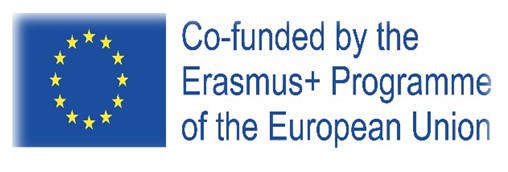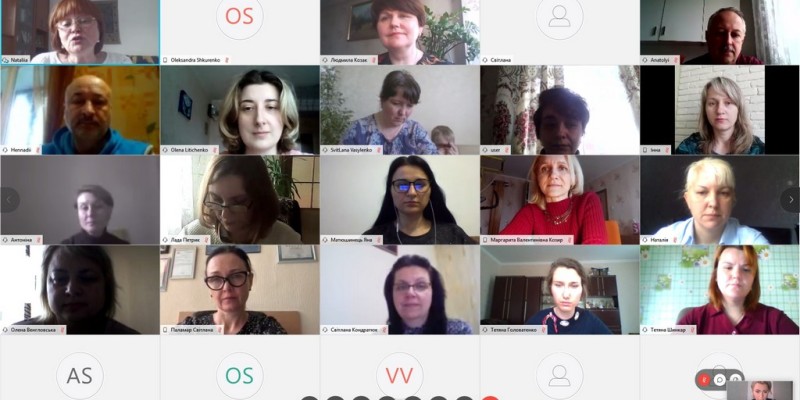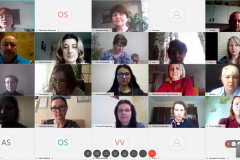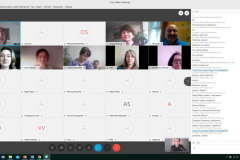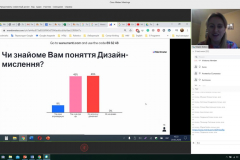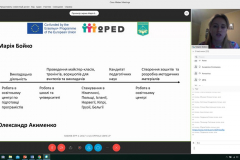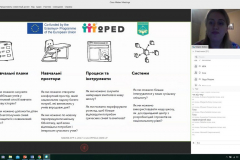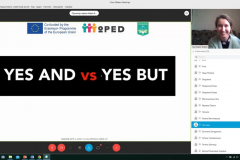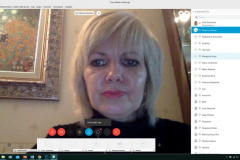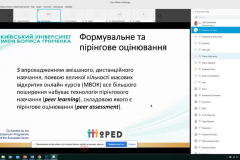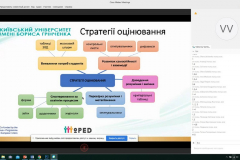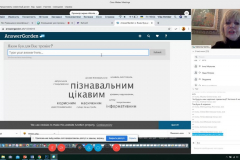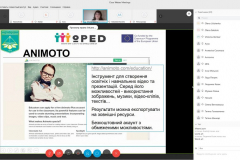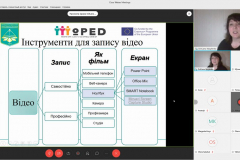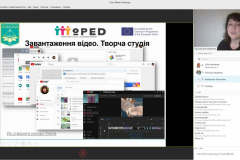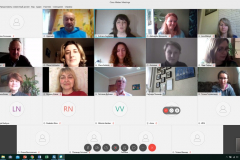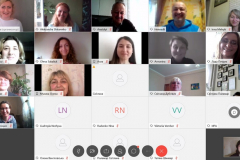On May 20 – 29, 2020 the advanced training in the form of online training was held at Borys Grinchenko Kyiv University within the framework of the international project “Modernization of Pedagogical Higher Education by Innovative Teaching Instruments” (MoPED) of the EU program Erasmus + KA2 – Development of Higher Education Capacity, No. 586098-EPP-1-2017-1-UA-EPPKA2-CBHE-JP to further use the tools in the Center of Innovative Educational Technologies.
32 scientific and pedagogical workers took part in advanced training, most of them are teachers of the Pedagogical Institute, who will work in the Center for Innovative Educational Technologies opened within the framework of the MoPED project at the beginning of the new school year.
Advanced training took place in a specially created online room. Participants received developed video instructions for joining – https://youtu.be/3Bzz-QtqSDA.
The advanced training program included 7 trainings and additional tasks for self-implementation with the use of new pedagogical technologies and digital tools. The trainings were lead by members of the academic group of the MoPED project under the guidance of the Project Manager of the Borys Grinchenko Kyiv University Nataliia Morze – Professor of Department of Computer Science and Mathematics of the Faculty of Information Technology and Management of Borys Grinchenko Kyiv University, Doctor of Pedagogical Sciences, Professor, Corresponding Member of National Academy of Pedagogical Sciences of Ukraine. The developed materials included the experience gained by the participants during training meetings and online trainings from European partners.
On May 20, at the training “Modern educational trends” Nataliia Morze introduced the participants to the concept of digital transformation of education, the results and challenges of COVID -19, discussed future professions and competencies that students should have in the 21st century. Further during the training “The concept of STEAM-education and basic teaching methods for its implementation” the speaker outlined for participants the concept of STEAM-education, its features and ways of implementation in primary school based on subject integration, description of STEAM-competencies and basic teaching methods and pedagogical technologies that will allow teachers to develop effectively scientific education and to form innovative students’ competencies.
The main aim of the training “Design-thinking to create innovations”, managed by Mariia Boiko – Senior Lecturer of Department of Computer Science and Mathematics of the Faculty of Information Technology and Management, was to teach participants to use tools of human-oriented approach and design thinking to solve problems. in various spheres of human life, encouraging the implementation of innovations in accordance with the needs of man, community and society. Design thinking is the most modern world method of creating innovation, which is actively used such huge companies as Facebook, Google, Apple, Procter & Gamble, Samsung, IBM, IKEA. Learning the basics of design thinking is an important part of the learning process at Stanford University and other world leading universities. The participants got acquainted with the concept of design thinking, its stages, the strategy of “double diamond”, the rules of generating ideas, research of the real users’ needs, possible types of prototypes and more.
On May 22, Viktoriia Vember – PhD in Pedagogy, Associate Professor of Department of Computer Science and Mathematics of the Faculty of Information Technology and Management, Associate Professor of Pedagogical Sciences, at the training “Research-cognitive method of teaching” introduced participants to the aspects of the use research-cognitive method (learning based on requests), its main features, considered examples of digital technologies to support the application of research-based learning technology (Inquiry Based Learning). The participants got acquainted with the structure of the Go-Lab ecosystem, that includes the Go-Lab portal, which contains a list of available virtual laboratories, applications that can be used to create research learning spaces, set of available research spaces and more. The participants got acquainted with the stages and phases of the research according to different models, in particular model 5E and the research cycle in Go-Lab. The peculiarities of searching for virtual laboratories on the Phet.colorado.edu website were demonstrated. Considerable attention was paid to getting acquainted with the platform for creating research learning spaces Graasp and considered the features of creating and using research learning spaces – Inquiry Learning Spaces (ILS) using the tools of the Graasp platform.
The training “Formative Assessment and Digital Technologies” started with an introductory survey of participants using the Kahoot.com service, which showed that training participants often need to lead surveys, discussions or quizzes for the audience, and they consider it important that the surveys were interesting, easy and interactive. During the training the participants got acquainted with the concept of formative assessment and its features, assessment strategies, goals of formative assessment at different stages of the lesson – before, during the work and at the end of the lesson. They got acquainted with the structure of the formative assessment process, examples of digital tools classified into different groups. determining for what purposes of formative assessment they can be used.
One of the types of formative assessment is peer assessment – the training highlighted the features of this type of evaluation, as well as its advantages and disadvantages compared to traditional assessment, as well as examples of digital resources that can be used for peer assessment. Reflection, as one of the types of formative assessment, was conducted at the end of the training using the service https://answergarden.ch/1239019.
On May 29, Svitlana Vasylenko – Deputy Head on the Content and Research of IT in Education Laboratory, teacher-methodologist, led a training “Storytelling and digital tools”, which presented examples of storytelling in the form of teaching history for updating, presenting new material and additional data on the discipline, possible tasks for students using this technology to develop such important skills of the successful young person of the 21st century as creativity, communication, problem-solving skills, etc. Participants noted the relevance of tasks for students, including the creation of word clouds, comics, intelligence cards and the importance of familiarizing themselves with tools for their use by students in the implementation of storytelling techniques, as well as interesting tasks for creating stories by students in different languages. solving a problem in order to reveal a certain idea concerning a work of art or a natural phenomenon. The participants supplemented their experience with a list of tools for creating a word cloud, which will be used as a condition of the task for students, evaluated the proposed list of tools for developing comics and the possibility of using it to record dialogues and polylogues in these comics.
During the training “Innovative class and purpose of basic equipment, methods of its use in the educational process” Liliia Varchenko-Trotsenko – Researcher in Digital competence development centre of IT in Education Laboratory, PhD in Pedagogy, participants got acquainted with the list of the basic equipment of innovative class and methods of its use in education. process, which was established at the Pedagogical Institute through the MoPED project. The main models of blended learning were discussed and the rotation areas and ways of organizing the educational process in ICR were discussed in more detail. Participants were introduced to the principles of using 3D printers, the process of scanning, designing and printing on it. Participants were shown ways to use robot designers, virtual reality glasses and other equipment of innovative class, digital flipchart and multimedia display to organize innovative teaching methods.
Colleagues – participants of the training spoke online and asked clarifying questions in the chat, as well as filled out questionnaires with feedback after each training. Thus, most of the participants noted the professional presentation of the material and the appropriate use of technological and technical resources, a high level of preparation and training.
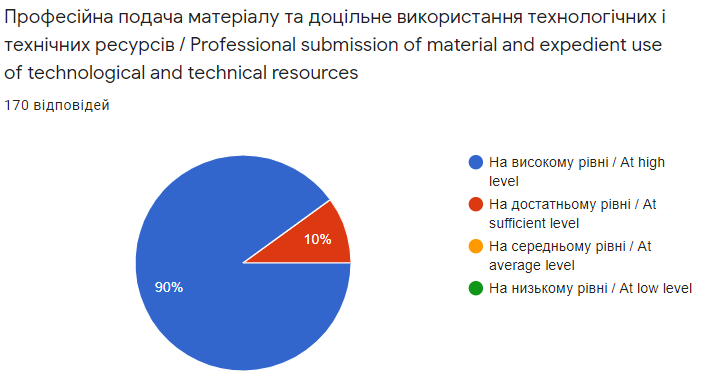
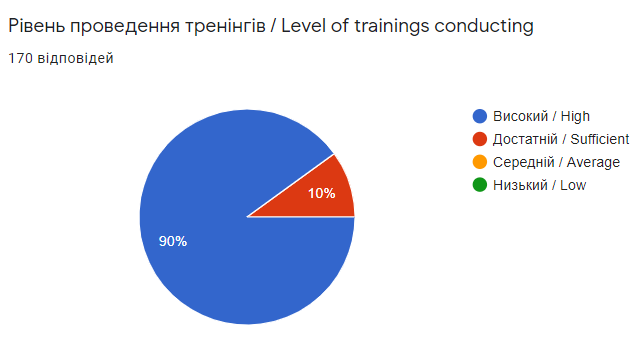
Participants noted that “The trainings were conducted effectively”, “It was useful to know new platforms and their practical usage”, they thanked “for practical recommendations and ideas on how to implement the proposed tools in working with students.” The materials of the presentations that the participants worked with during the trainings were sent by e-mail.
